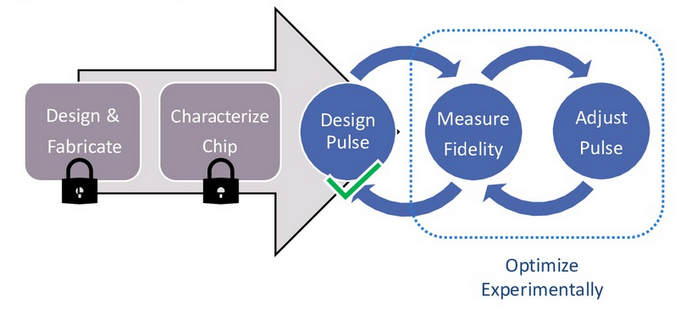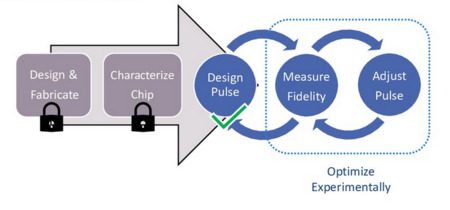Quantum Optimal Control
The primary focus of this project will be on the design, optimal characterization and control of multi-qubit superconducting devices based on transmon qubits in a circuit QED architecture.
We will use measurement in a closed-loop way to optimize the tune-up of the system to obtain high-fidelity quantum gates. The project also addresses the question how to tailor control and measurements of a complex multi-qubit quantum processor in order to obtain targeted information in the most efficient and robust way. We will develop the tools to make best use of the retrievable information in our measurements, including statistical accuracies, backgrounds and imperfections, to find an optimal model of the system by comparing experimentally measured results with numerical/analytical predictions. The project is part of the EU training network QuSCo in which we are closely collaborating with the group of Frank Wilhelm-Mauch.

The primary focus of this project will be on the design, optimal characterization and control of multi-qubit superconducting devices based on transmon qubits in a circuit QED architecture. We will use measurement in a closed-loop way to optimize the tune-up of the system to obtain high-fidelity quantum gates. The project also addresses the question how to tailor control and measurements of a complex multi-qubit quantum processor in order to obtain targeted information in the most efficient and robust way. We will develop the tools to make best use of the retrievable information in our measurements, including statistical accuracies, backgrounds and imperfections, to find an optimal model of the system by comparing experimentally measured results with numerical/analytical predictions. The project is part of the EU training network QuSCo in which we are closely collaborating with the group of Frank Wilhelm-Mauch.
The primary focus of this project will be on the design, optimal characterization and control of multi-qubit superconducting devices based on transmon qubits in a circuit QED architecture. We will use measurement in a closed-loop way to optimize the tune-up of the system to obtain high-fidelity quantum gates. The project also addresses the question how to tailor control and measurements of a complex multi-qubit quantum processor in order to obtain targeted information in the most efficient and robust way. We will develop the tools to make best use of the retrievable information in our measurements, including statistical accuracies, backgrounds and imperfections, to find an optimal model of the system by comparing experimentally measured results with numerical/analytical predictions. The project is part of the EU training network QuSCo in which we are closely collaborating with the group of Frank Wilhelm-Mauch.
Team members
Max Werninghaus (PhD student working at IBM Research – Zurich)
Federico Roy (PhD student working IBM Research – Zurich)
Collaborators
Daniel Egger (IBM Research – Zurich)
Shai Machnes & Frank Wilhelm-Mauch (University Saarland)

